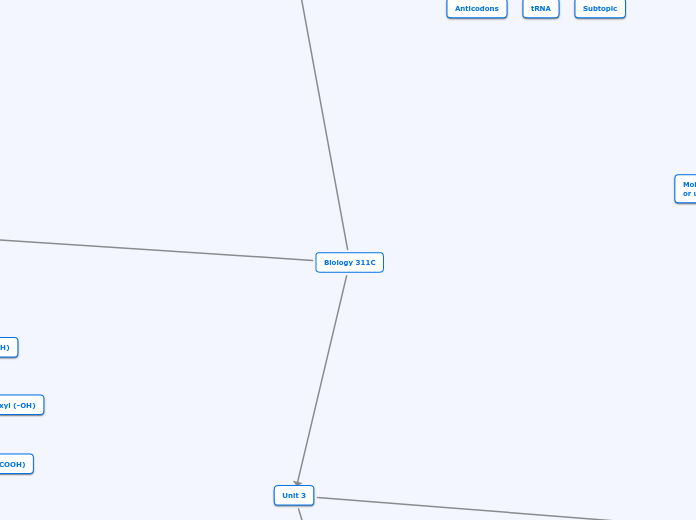Biology 311C
Unit 1
Bonds
Intramolecular
Covalent
Nonpolar
Polar
Ionic
Intermolecular
Dipole-Dipole
Hydrogen Bond
Ion-Dipole
Hydrophobic
Van der Waals
Organic Compounds
Isomers
Structural
Geometric
Enantiomers
Carbon skeletons
Length
Branching
Double Bonds
Rings
Functional Groups
Hydroxyl (-OH)
Carbonyl (-C=O)
Carboxyl (-COOH)
Amino (-NH3)
Sulfhydryl (-SH)
Phosphate ((-PO4)^3-)
Methyl (-CH3)
Unit 2
DNA Replication
Experiments
Griffith and Avery, MacLeod, and McCarty
With S - Mouse Dies
With R - Mouse Lives
With Heated S - Mouse Lives
With Heated S + R - Mouse Dies
Messleson and Stahl
Semiconservative (Proven)
Conservative
Dispersive
Hershey and Chase
35S-Labeled Protein
32P-Labeled DNA in pellet
Chargaff's Rule
Process
Parts
Origin of Replication (ORI)
Leading Strands
Lagging Strands
Okazaki Fragments
Replication Forks
Proteins
Helicase
SSB
Topoisomerase
Primase
DNA Polymerase III
DNA Polymerase II
DNA Ligase
Gene Expression
Transcription
Process
Parts
Promoter
Transcription Start Site (+1)
Template Strand
Terminator
Stages
Initiation
Elongation
Termination
Proteins
Prokaryotes
RNA Polymerase
Eukaryotes
RNA Polymerases I,II, & III
Poly-A tail
5' cap
Translation
Process
Proteins
Ribosomes
Amino acids
Amino acyl tRNA synthetase
Peptidyl transferase
Initiation Factors
Elongation Factors
Release Factors
Parts
mRNA
Codons
Anticodons
tRNA
Subtopic
Peptide Bonds
RNA Processing
Parts
Introns (Removed)
Exons (Kept)
Spliceosomes
Unit 3
Energy
Metabolism
Catabolism
Anabolism
Thermodynamics
1st Law
2nd Law
Forms of Energy
Free Energy
DG<0 - spontaneous
DG=0 - equilibrium
DG>0 - nonspontaneous
DG = DH-TDS
ATP
Work Done by ATP
Chemical
Transport
Mechanical
Energy Coupling
Endergonic + Exergonic; DG<0
Energy Flow
Energy Flows through ecosystems; energy lost through heat
Matter cycles within ecosystem
Cell Membrane
Components
Phospholipids
More Unsaturated Lipids - Fluid
More Saturated Lipids - Viscous
Proteins
Functions
Transport
Enzymes
Signal Transduction
Cell-Cell Recognition
Intercellular Joining
Cytoskeleton and ECM attachment
Types
Integral
Peripheral
Cholesterol
Maintains Fluidity
Permeability
Transport
Active
Molecules going against
or up concentration gradient
Requires Energy (ATP)
Proton Pumps
Pump out H+
Ion Pumps
Pump out K+ and Na+
Simple Diffusion
Small, nonpolar molecules
Osmosis
Tonicity
Hypotonic
Less solute
Isotonic
Same cencentration of solute
Hypertonic
More solute
Facilitated Diffusion
Large and/or Polar molecules
Channel Proteins
Carrier Proteins
Action Potential
Resting State
Depolarization
Na+ gate opens
Rising phase
More Na+ gates open
Falling phase
K+ gates open
Na+ gates close
Undershoot
Cell slightly more negative
than resting state
Endocytosis and
Exocytosis
Phagocytosis
Pinocytosis
Receptor-Mediated Endocytosis
